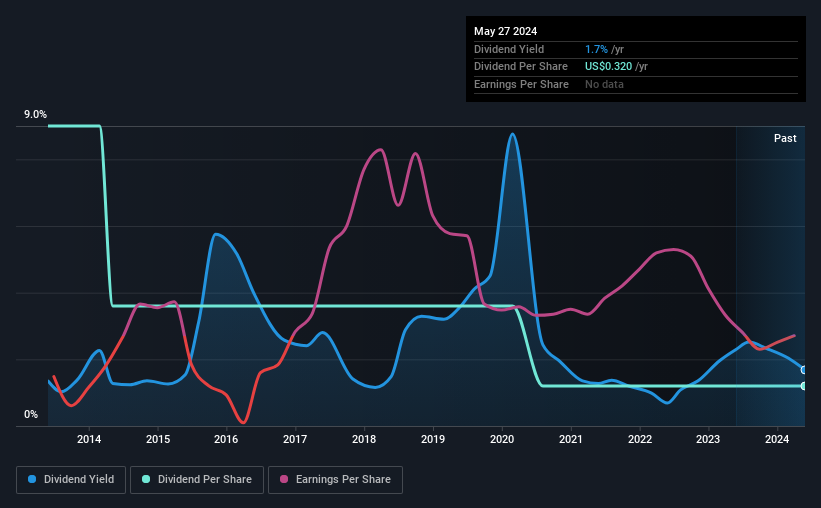The board of Valhi, Inc. (NYSE:VHI) has announced that it will pay a dividend of $0.08 per share on the 27th of June. This means the dividend yield will be fairly typical at 1.7%.
While the dividend yield is important for income investors, it is also important to consider any large share price moves, as this will generally outweigh any gains from distributions. Investors will be pleased to see that Valhi's stock price has increased by 42% in the last 3 months, which is good for shareholders and can also explain a decrease in the dividend yield.
See our latest analysis for Valhi
Valhi Doesn't Earn Enough To Cover Its Payments
While it is always good to see a solid dividend yield, we should also consider whether the payment is feasible. Prior to this announcement, the company was paying out 1,520% of what it was earning, however the dividend was quite comfortably covered by free cash flows at a cash payout ratio of only 20%. Generally, we think cash is more important than accounting measures of profit, so with the cash flows easily covering the dividend, we don't think there is much reason to worry.
If the company can't turn things around, EPS could fall by 68.5% over the next year. If the dividend continues along the path it has been on recently, the payout ratio in 12 months could be 3,951%, which is definitely a bit high to be sustainable going forward.

Dividend Volatility
Although the company has a long dividend history, it has been cut at least once in the last 10 years. The dividend has gone from an annual total of $2.40 in 2014 to the most recent total annual payment of $0.32. Dividend payments have fallen sharply, down 87% over that time. Declining dividends isn't generally what we look for as they can indicate that the company is running into some challenges.
Dividend Growth Potential Is Shaky
Given that dividend payments have been shrinking like a glacier in a warming world, we need to check if there are some bright spots on the horizon. Valhi's earnings per share has shrunk at 68% a year over the past five years. This steep decline can indicate that the business is going through a tough time, which could constrain its ability to pay a larger dividend each year in the future.
The Dividend Could Prove To Be Unreliable
Overall, we don't think this company makes a great dividend stock, even though the dividend wasn't cut this year. The payments haven't been particularly stable and we don't see huge growth potential, but with the dividend well covered by cash flows it could prove to be reliable over the short term. Overall, we don't think this company has the makings of a good income stock.
Market movements attest to how highly valued a consistent dividend policy is compared to one which is more unpredictable. However, there are other things to consider for investors when analysing stock performance. Just as an example, we've come across 4 warning signs for Valhi you should be aware of, and 1 of them is concerning. Is Valhi not quite the opportunity you were looking for? Why not check out our selection of top dividend stocks.
New: Manage All Your Stock Portfolios in One Place
We've created the ultimate portfolio companion for stock investors, and it's free.
• Connect an unlimited number of Portfolios and see your total in one currency
• Be alerted to new Warning Signs or Risks via email or mobile
• Track the Fair Value of your stocks
Have feedback on this article? Concerned about the content? Get in touch with us directly. Alternatively, email editorial-team (at) simplywallst.com.
This article by Simply Wall St is general in nature. We provide commentary based on historical data and analyst forecasts only using an unbiased methodology and our articles are not intended to be financial advice. It does not constitute a recommendation to buy or sell any stock, and does not take account of your objectives, or your financial situation. We aim to bring you long-term focused analysis driven by fundamental data. Note that our analysis may not factor in the latest price-sensitive company announcements or qualitative material. Simply Wall St has no position in any stocks mentioned.
About NYSE:VHI
Valhi
Engages in the chemicals, component products, and real estate management and development businesses in Europe, North America, the Asia Pacific, and internationally.
Excellent balance sheet with acceptable track record.
Market Insights
Community Narratives



